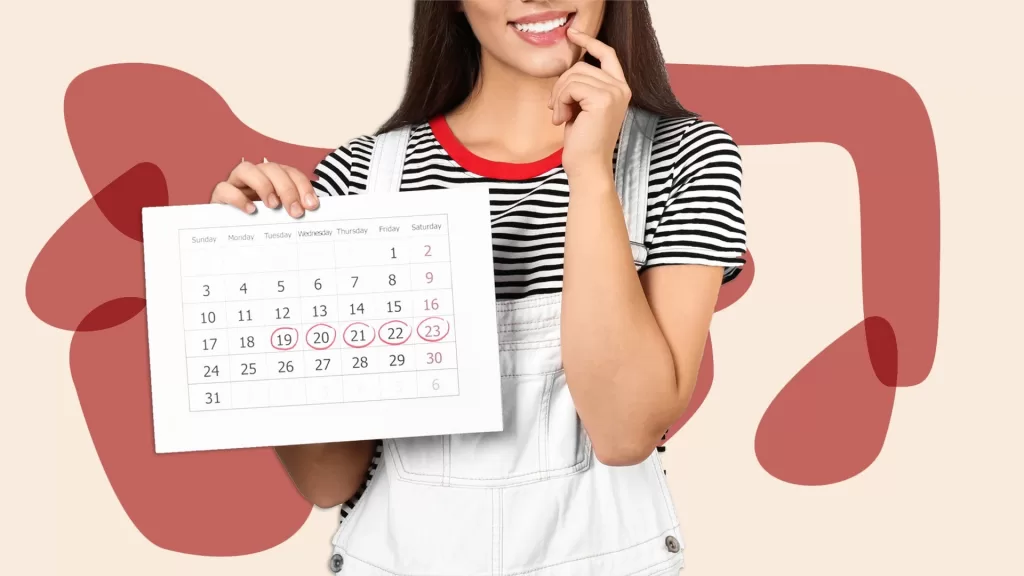That time of the month when Granny Flo comes to visit, your emotions take a beating, and you go for a hide. Women often talk about their periods in code words and phrases so they don’t have to talk about them directly. Despite the fact that most women will have periods at some point in their lives, many individuals avoid talking about it openly. There are so many misconceptions about the menstrual cycle because talking about it is taboo.
In 2023, there is approx 8.015 billion people on the planet, 3.90 billion of whom will have female genitalia at birth. Almost all women have gone through or will go through menstruation, the time of the monthly cycle when the uterus releases mucosal tissue and blood via the vagina. The average length of a woman’s menstrual cycle is 28 days, but it can range from 27 to 32 days.

Myths and misconception has been there since ages
Even though this biological process affects more than half of the world’s people, there are still a lot of myths and misconceptions about it. Periodic blood is still seen as “filthy” and “impure” by many cultures, and menstruation is often avoided as a taboo subject.
Even though this is generally not allowed anymore, as a series of recent disasters in Nepal show, some communities still have so-called “menstruation huts” where women can spend the days they bleed alone. Inspite this severe case, numerous lesser myths and misconceptions about menstruation persist all around the world.
If you want to know what people usually get wrong and why, read this Spotlight article. Since middle school, when you first learned about your period, you’ve probably heard rumors and heard things that aren’t true about period supplies, hormones, and pregnancy. Read on to find out what is and is not true about Periods, that you had either come across frome somewhere or being fed on to you. Stop Believing Myths!
1. Pregnancy is impossible during your period.
Keep using condoms even if you’re on your period; the risk of pregnancy is low but still present.
When you get your period, it’s because your body is preparing for pregnancy by ovulating and thickening the lining of your uterus in anticipation of a future pregnancy. There’s a common misconception that once this lining is gone, a woman can never get pregnant again.
Technically, you won’t be able to conceive during this time, but sperm can survive inside your body for up to five days. That means that sperm can survive in your body before, during, and after your period, making pregnancy a real possibility. Whether or not you are menstruating, if you are sexually active and do not wish to become pregnant, you should use protection.
backaches, headaches, and migraines. By stimulating the release of endorphins like dopamine and oxytocin, sex can have a surprisingly positive effect on one’s mood.
2. It is harmful to repeatedly delay menstruation
Another common myth is that it’s dangerous to use birth control to stop bleeding for a long time.
But new recommendations from the National Women’s Health Network say it’s permissible to suppress menstruation with birth control pills, and most gynecologists agree that this strategy is usually safe.
In fact, there are some people who think that periods don’t serve any purpose other than reproduction and are just a bother.
As one expert in the field of gynecology and obstetrics at Johns Hopkins University in Baltimore, MD, named James Segars, told The Atlantic, “Having a monthly period is reassuring, but it is certainly not necessary.”
These long-acting, reversible birth control methods have a very low failure rate, so they are very helpful to women. During their periods, a lot of women have severe pain that can make their daily lives very hard. Heavy bruising, excruciating pain, and other distressing symptoms like headaches and nausea are possible.
Women with illnesses like endometriosis or dysmenorrhea (painful periods) may decide, after talking to their doctors, that skipping menstruation or skipping it more than once is in their best medical and professional interests.
It’s a known fact that your period may or may not arrive on time, regardless of how punctual you are. Your physical cycle is as individual as you are.
Most of the time, a woman’s period lasts five days and happens every four to five weeks. However, cycles can vary in length, frequency, and duration, even within the same month. Plan your trip around your period with caution, and don’t throw out your extra tampons just yet. It’s better to be ready for your period whenever it arrives than to be caught off guard.
3. Premenstrual syndrome is caused solely by emotional turmoil in the mind
You are not alone in your desire to cry because your husband ate the last cookie or your desire to go to bed early.
Premenstrual syndrome (PMS) causes a woman to be irritable, tired, anxious, and depressed in the days before or during her period. In the United States, more than nine out of ten women report feeling some sort of discomfort during their periods.
“Some women only experience moderate PMS symptoms.” If they are serious enough, though, you may need to take time off from work or school. “Hormones are to blame in both cases, and you have no say in the matter,” Dr. Kurey remarked.
Premenstrual syndrome is thought to be caused by a big drop in hormones like estrogen and progesterone after a woman finds out she is not pregnant. These signs and symptoms disappear when your hormone levels begin to normalize again.
Even though you have no say over your hormone levels, there are things you can do to lessen the severity of PMS. Some says that they have been able to keep my health this month by working out regularly, eating well, managing my stress, getting enough rest, and not smoking.
Attempting to alleviate physical discomfort by using over-the-counter medications. Hormonal birth control, antidepressants, diuretics (pills to prevent bloating), and anti-anxiety medications are all examples of prescription drugs.
If your premenstrual syndrome symptoms are making it difficult for you to function normally, it’s time to talk to your family doctor or a gynecologist. They can recommend ways to manage them, such as dietary or medicinal adjustments, that will help you feel better.
4. Periodic blood is Filthy and Dirty
There are many ways to soak up period blood, such as with tampons, pads, and menstrual But if a tampon is left in for more than 8 hours, it can lead to an infection called toxic shock syndrome (TSS). But if a tampon is left in for more than 8 hours, it can lead to an infection called toxic shock syndrome (TSS).
Aside from these, you can deal with period blood in various ways, such as:
- Menstrual cups, made of silicone, are inserted into the vagina to collect blood and can be reused after being cleaned. They are sometimes a low-cost and easy choice to make.
- Underwear designed to absorb your period blood may be washed and worn again. Use them instead of constantly buying new period items, and you won’t just save money; you’ll also be helping the environment.
Many women don’t talk about their periods because, among other things, they involve blood or their reproductive systems. If you never bring up the subject of menstruation with anyone, you can end up believing or spreading some of the myths that circulate around it.
Menstruating can be scary for anyone, whether it’s their first time or they’ve been doing it for years. If we keep talking about it, moms, daughters, aunts, and friends can all assist each other in getting through this monthly rite of passage with a little less pain and discomfort.
If you have any questions or concerns about your period, please talk to your family doctor or a gynecologist. There could be solutions to make your period more manageable. A woman’s menstrual cycle is a natural physiological occurrence. Every month brings new physical changes for women, and they should embrace them with pride and gratitude.
5. Bathing and washing Hair to be avoided during menstruation
When someone takes a hot bath, the increased blood flow eases menstrual cramps and reduces muscle tension.
Even after being completely submerged in water, the bleeding continues. However, the vaginal blood flow could be briefly stifled by the water’s pressure.
You can still have a nice, relaxing bath or shower even if you’re on your period. You may probably enhance your mood and make it through menstruation with the help of a bubble bath, which will make you feel clean and relaxed at the same time.
It is better to clean the vulva with water and mild, unscented soap than wipes or other things because it is cleaner. This is because a lot of products that are meant to be used in the vaginal area might upset the natural balance of germs there, making it easier to get sick.
According to Medical News Today, research published last year found that intimate care products like gel sanitizers and vaginal cleansers were linked to a higher risk of infection. There may be further positive effects on one’s health from taking a hot bath. Based on the results of one study reported by MNT last year, taking a bath may help with inflammation and blood sugar.
If we didn’t have such a negative view of menstruation as a whole, this might not be such a big humanitarian problem. We have a lot of shame to shed, though. Period shame does not work since it is so deeply embedded in our behavior.
The need for a tampon is not something that should make us feel like we have to hide one under our shirt or mumble about it. Having a period or discussing having one is not unusual. Let’s break this pattern and eliminate the negative connotation. After all, the key to a long, healthy life is to keep your reproductive hormones at a healthy level and have regular periods.
6.to hide and be shameful
If we didn’t have such a negative view of menstruation as a whole, this might not be such a big humanitarian problem. We have a lot of shame to shed, though. Period shame does not work since it is so deeply embedded in our behavior.
The need for a tampon is not something that should make us feel like we have to hide one under our shirt or mumble about it. Having a period or discussing having one is not unusual. Let’s break this pattern and eliminate the negative connotation. After all, the key to a long, healthy life is to keep your reproductive hormones at a healthy level and have regular periods.
We may thank our periods for helping us live longer and reducing our risk of heart disease.

7. Periods Sync between friends
When it comes to syncing, periods often beg the question. So, will it be the case that if two or more women live together, say, in a dorm, that they will all have their periods at the same time?
Someone who talked to MNT said that they had learned about period synchrony in school and were still not sure if it was true.
When I was in high school, I went to an all-female institution, and that’s where I first heard about period synchronizing. Then, when I moved in with [my two female roommates], I saw that our periods were typically close together. According to [another acquaintance], this is because she is an alpha female, whose hormones disrupt the menstrual cycles of the women in her immediate vicinity.
The question that needs to be asked then is, “Is there any truth to any of this?” After all, many of us have probably experienced “period syncing” at some point in our lives, whether we lived, worked, or went to school with other people.
In 1971, an article in the journal Nature was the first time scientists heard about period synchrony. According to this article, the likelihood of menstrual synchronization increases when women live in close quarters (such as a college dorm) or are close friends.
The authors of the study hypothesized that this was the result of “pheromone exchange” amongst the women who shared a neighborhood.
But more recent research has called into question the methods used in the 1971 study. Later research brought to light a lot of limitations and moderating factors that the first researchers didn’t think about. In addition, it was stated that there was “a lack of empirical evidence for synchronization in the previous studies of both Western and non-Western societies.”
Furthermore, subsequent investigations were unable to duplicate the initial research’s results. convincingly. More recent studies have not found evidence of menstrual synchronization among college roommates.
Since then, researchers have become more and more sure that the idea is made up and that any synchronicity is just a coincidence.
The BBC quoted Alexandra Alvergne, an associate professor of biocultural anthropology at the University of Oxford in the United Kingdom, as saying, “As humans, we always appreciate thrilling stories.” We’re looking for a useful analogy to describe the data we’ve collected. The idea that our observations are due to random events or luck just doesn’t make as much sense.
We may thank our periods for helping us live longer and reducing our risk of heart disease.
Disclaimer:
The author’s views are his or her own. The facts and opinions in the article have been taken from various articles and commentaries available in the online media and Eastside Writers does not take any responsibility or obligation for them.
Note: Contact our Writers at www.eastsidewriters.com for writing Blogs/Articles on any niche. We have experts in various domains from Technology to Finance and from Spirituality to Lifestyle and Entertainment.







Pingback: Know The Incredible Wonders Of Ginger That It Does To Our Health
Pingback: The autoimmune disease Systemic Lupus and its serious consequences - Eastside Writers
Pingback: 7 Ways To Get Relief From Your Menopause Symptoms - Eastside Writers
Pingback: The Silent Thief of Oxygen: Exploring the Causes, Symptoms, and Treatments of Anemia - Eastside Writers
Pingback: Shatavari - A Powerful unique Herb for Women's Reproductive Health and Wellness - Eastside Writers